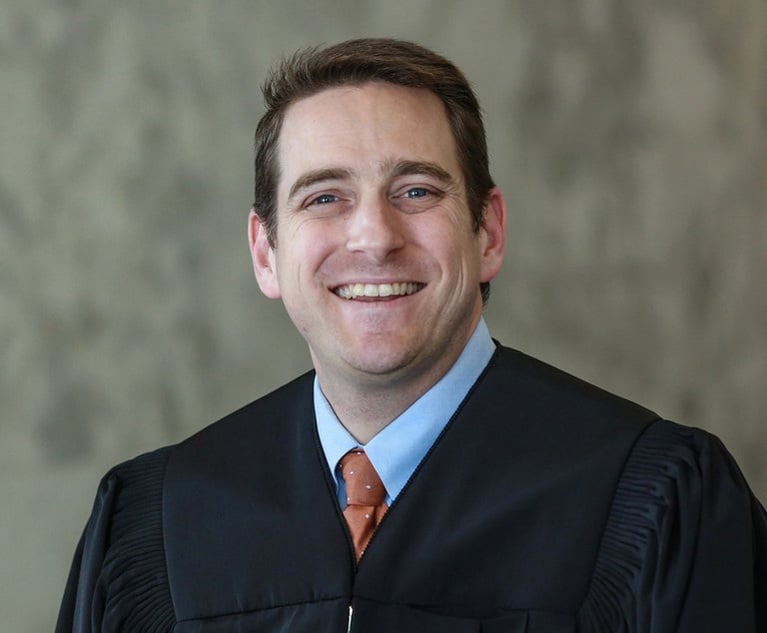The Selfish Reasons Why Junior Attorneys Should Pursue Pro Bono Work
This year I experienced, far and away, the highlight of my 10-year legal career. I argued to the California Supreme Court that Proposition 66—which…
December 18, 2017 at 07:00 AM
7 minute read
This year I experienced, far and away, the highlight of my 10-year legal career. I argued to the California Supreme Court that Proposition 66—which Californians passed last November by a very narrow margin—was unconstitutional. That Proposition sought to speed up and limit the appeal process for persons who have been sentenced to death. It did so by, among other things, requiring California's courts to decide death penalty appeals and petitions for habeas corpus within time limits that were far shorter than the time frames in which California's courts have historically decided those cases. I argued that requiring the courts to speed up their processing of these very important appeals violated both the separation-of-powers doctrine and capital defendants' constitutional rights, because it would either: (1) cause the courts to miss important issues critical to whether capital defendants deserved the death; (2) so clog the courts with death penalty cases that they would not have sufficient time for the other cases on their docket; or (3) both. I also argued that what voters had been told about Proposition 66 did not align with the true impact that Proposition 66 would have on the courts and on capital defendants.
I won, at least in part. The California Supreme Court decided that the time limits set forth in Proposition 66 raised separation-of-power “concerns,” and decided to interpret those time limits as only “an exhortation to the parties and the courts to handle cases as expeditiously as is consistent with the fair and principled administration of justice.” In other words, as a result of our constitutional challenge, the Court interpreted the language of Proposition 66 in a way that lessened the serious impact it otherwise would have had on the orderly functioning of the courts and on capital defendants' rights.
Arguing in front of the California Supreme Court is everything you would hope it would be. It was challenging and inspiring. The judges, not surprisingly, are smart. They came to that hearing incredibly well-versed in the issues, with all the hardest questions prepared to throw at attorneys on both sides.
Why, you might ask, was a relatively junior lawyer put in that position? Why was a 10-year attorney tasked with arguing this literally life-and-death case to the California Supreme Court? Because I took the case pro bono. And after working the case for a year, much to my own surprise, I was the right person to argue it.
My experience demonstrates two selfish reasons why junior attorneys should pursue pro bono work. First, pro bono work can provide to junior attorneys experiences and opportunities that those attorneys would not otherwise get at their level. This lesson is nothing new. We have all heard this throughout our careers. Second, and perhaps more surprisingly, pro bono work can remind junior attorneys that they are in fact qualified for these experiences and opportunities.
There is something disempowering about being a young lawyer in a big law firm. When you join a big law firm as a first-year associate, you transform from a law school graduate—a person who thinks you are capable of conquering the world—into a person who isn't sure you know how to write an email. Everything you write gets edited, critiqued, and transformed by more senior members of the team, until you start to lose faith that you are capable of doing anything without that level of review.
On the really big cases, people often don't trust junior attorneys with the fun stuff, like opening arguments and cross examinations. And that makes sense. It's a risk for an excellent 30-year lawyer to hand a task like that off to a more junior attorney. If that 30-year lawyer knows he or she will do a phenomenal job at a certain task, is it in the client's best interest to pass that task to someone more junior? On a high-value case with an important client, is it worth the risk? From the perspective of training rising lawyers, of course it is. But the client probably won't see it that way if the junior attorney messes up.
A trial I participated in last year underscores this point. It was a massive intellectual property jury trial between two Silicon Valley tech giants. More senior attorneys did the opening argument, closing argument, and all the direct and cross examinations. I stood up in court long enough to present videotaped deposition testimony to the jury. And that allocation of responsibilities made sense to me.
It was with this mindset that I learned that the California Supreme Court wanted to hear oral argument on our constitutional challenge to Proposition 66. Despite leading the team on all the briefing that got us to that point, I immediately started looking around, wondering when one of my more experienced partners would take over the oral argument. They didn't. Instead, they told me that because I had been the one working the case, I was the right person to argue it. And they were right.
Maybe I shouldn't have needed this lesson, but the Proposition 66 case taught me that hard work, not years of experience, is what really matters in the courtroom. I am an intellectual property attorney who happened to agree to a pro bono death penalty case. In contrast, my opponent in that case had decades of experience fighting to create stronger death penalty laws in jurisdictions across the United States. According to his online biography, he has “written over 100 briefs in cases in the United States Supreme Court.” He received his law degree the year I was born. In short, I was very worried about going up against this man.
So, I did what I always do when worried: I prepared. I spent the weeks before oral argument doing nothing but prepare. I researched and re-researched the relevant issues (and a lot of irrelevant issues as well). I mocked that argument to anyone who would listen, as many times as they were willing to hear it. And, at the end of the day, I am exceedingly proud of my performance in that courtroom. I knew the issues, and I had answers for the judges' most difficult questions. Sure, after watching the video of that argument several times, there are style points I would make to my past self. There are a few things I wish I had said. But I am secure in the belief that I gave persons convicted with the death penalty as strong a representation as anyone could have. Put more simply, I was not out-gunned in that room by someone else's years of experience.
Now, I'll be the first to say that I received a lot of help on the Proposition 66 case. A ton of luminaries in the death penalty community generously gave their time to this case, to set me straight on the basics of habeas corpus litigation in California, point me to the right resources to cite for statistics on the death penalty, write glowing amicus briefs, review and comment on draft briefs, and moot the argument over and over again. I couldn't have done it without their help. But I did it. And knowing that I did it has been deeply rewarding to me personally, and has also made me a stronger, more confident lawyer in my intellectual property practice.
What I want to say to any junior attorney who has read this far is: “You could do it too.” Take on things that matter to you. You can have a tremendous impact, and the experiences you gain will enrich you in ways you never thought possible.
Christy Von der Ahe Rayburn is a partner in the Orange County office of Orrick, Herrington & Sutcliffe and a member of the firm's IP practice group. Orrick took this case pro bono after being contacted by the American Bar Association's Death Penalty Representation Project.
This content has been archived. It is available through our partners, LexisNexis® and Bloomberg Law.
To view this content, please continue to their sites.
Not a Lexis Subscriber?
Subscribe Now
Not a Bloomberg Law Subscriber?
Subscribe Now
NOT FOR REPRINT
© 2025 ALM Global, LLC, All Rights Reserved. Request academic re-use from www.copyright.com. All other uses, submit a request to [email protected]. For more information visit Asset & Logo Licensing.
You Might Like
View All
4th Circuit Upholds Virginia Law Restricting Online Court Records Access
3 minute read

California Court Denies Apple's Motion to Strike Allegations in Gender Bias Class Action
Trending Stories
- 1Midsize Firm Bressler Amery Absorbs Austin Boutique, Gaining Four Lawyers
- 2Bill Would Allow Californians to Sue Big Oil for Climate-Linked Wildfires, Floods
- 3LinkedIn Suit Says Millions of Profiles Scraped by Singapore Firm’s Fake Accounts
- 4Supreme Court Agrees to Hear Lawsuit Over FBI Raid at Wrong House
- 5What It Takes to Connect With Millennial Jurors
Who Got The Work
J. Brugh Lower of Gibbons has entered an appearance for industrial equipment supplier Devco Corporation in a pending trademark infringement lawsuit. The suit, accusing the defendant of selling knock-off Graco products, was filed Dec. 18 in New Jersey District Court by Rivkin Radler on behalf of Graco Inc. and Graco Minnesota. The case, assigned to U.S. District Judge Zahid N. Quraishi, is 3:24-cv-11294, Graco Inc. et al v. Devco Corporation.
Who Got The Work
Rebecca Maller-Stein and Kent A. Yalowitz of Arnold & Porter Kaye Scholer have entered their appearances for Hanaco Venture Capital and its executives, Lior Prosor and David Frankel, in a pending securities lawsuit. The action, filed on Dec. 24 in New York Southern District Court by Zell, Aron & Co. on behalf of Goldeneye Advisors, accuses the defendants of negligently and fraudulently managing the plaintiff's $1 million investment. The case, assigned to U.S. District Judge Vernon S. Broderick, is 1:24-cv-09918, Goldeneye Advisors, LLC v. Hanaco Venture Capital, Ltd. et al.
Who Got The Work
Attorneys from A&O Shearman has stepped in as defense counsel for Toronto-Dominion Bank and other defendants in a pending securities class action. The suit, filed Dec. 11 in New York Southern District Court by Bleichmar Fonti & Auld, accuses the defendants of concealing the bank's 'pervasive' deficiencies in regards to its compliance with the Bank Secrecy Act and the quality of its anti-money laundering controls. The case, assigned to U.S. District Judge Arun Subramanian, is 1:24-cv-09445, Gonzalez v. The Toronto-Dominion Bank et al.
Who Got The Work
Crown Castle International, a Pennsylvania company providing shared communications infrastructure, has turned to Luke D. Wolf of Gordon Rees Scully Mansukhani to fend off a pending breach-of-contract lawsuit. The court action, filed Nov. 25 in Michigan Eastern District Court by Hooper Hathaway PC on behalf of The Town Residences LLC, accuses Crown Castle of failing to transfer approximately $30,000 in utility payments from T-Mobile in breach of a roof-top lease and assignment agreement. The case, assigned to U.S. District Judge Susan K. Declercq, is 2:24-cv-13131, The Town Residences LLC v. T-Mobile US, Inc. et al.
Who Got The Work
Wilfred P. Coronato and Daniel M. Schwartz of McCarter & English have stepped in as defense counsel to Electrolux Home Products Inc. in a pending product liability lawsuit. The court action, filed Nov. 26 in New York Eastern District Court by Poulos Lopiccolo PC and Nagel Rice LLP on behalf of David Stern, alleges that the defendant's refrigerators’ drawers and shelving repeatedly break and fall apart within months after purchase. The case, assigned to U.S. District Judge Joan M. Azrack, is 2:24-cv-08204, Stern v. Electrolux Home Products, Inc.
Featured Firms
Law Offices of Gary Martin Hays & Associates, P.C.
(470) 294-1674
Law Offices of Mark E. Salomone
(857) 444-6468
Smith & Hassler
(713) 739-1250










